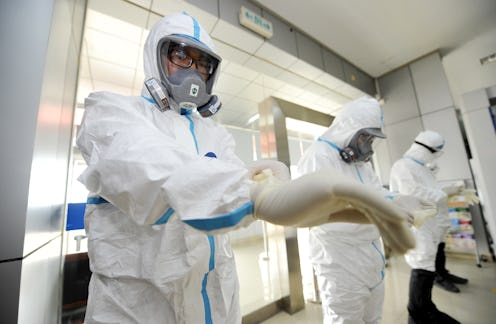News
American Back Controversial Quarantine Orders
If you want a sign of how worried Americans are about Ebola, this may be it. You may have heard Monday that nationally known Ebola nurse Kaci Hickox settled her lawsuit against the state of Maine, springing her from mandatory quarantine in exchange for her ongoing self-monitoring of her health. It seemingly brought a science-based resolution to a national controversy — Hickox tested negative for Ebola, and reportedly displayed no symptoms. But a huge majority of Americans probably aren't happy about it: Over 70 percent of Americans support mandatory Ebola quarantines for health workers returning from afflicted West African states, a huge majority that stands at odds with no less than the Obama administration itself.
The results were determined by a Reuters/Ipsos poll reported Monday, and taken in full, this much seems clear — a lot of Americans probably really don't like Hickox, and her quest to assert her freedom of movement. That's because the poll found even higher support, at 80 percent, for controlling the movements of health care workers who've returned home, which is essentially what Hickox deliberately defied in her very public bike ride last week, prior to getting legal clearance to be out and about. All in all, they're very telling and important outcomes, favoring the approach of Governors like Chris Christie and Andrew Cuomo over no less than the White House itself.
Here are the facts on Ebola as they're currently understood, which reflect why this poll outcome is, at the very least, out-of-step with a number of authorities on the subject. Basically, Ebola is only known to be contractible if you come into direct physical contact with the bodily fluids of an infected, symptomatic person. The harrowing symptoms that come along with Ebola produce a lot of such infected fluids, however — victims suffer with internal and external bleeding, vomiting, diarrhea, and fever (which induces sweating).
But even somebody who's been infected by the highly lethal virus isn't a danger to infect others if they aren't exhibiting symptoms yet, which is part of why Hickox's self-monitoring was such an important part of her settlement — if she suddenly gets a fever tomorrow, she needs to notify health authorities. But absent the onset of such symptoms, she's not a threat to others.
But the perception of threat, along with the first high-profile case of Ebola in New York City, may be spurring a desire for an excess of caution among the American public. This is understandable, honestly, given just how frightening the reality of having Ebola is, and the grisly images and reports coming out of Sierra Leone, Guinea, and Liberia. But the intensely remote odds that any individual American would actually contract it, and the obvious fact that America's health infrastructure is lightyears beyond that of those stricken West African states, should ideally cut against that hysteria.
It's easy to not quite get the fuss, I realize — the idea that someone is unwilling to wait three weeks in service of such a vital public health goal might rub you the wrong way, all things considered. But probably the main reason to worry about this sort of policy reaching mainstream acceptance is that it risks ostracizing and discouraging more would-be volunteers from fighting the outbreak in West Africa. An outbreak which, until thwarted, Americans can't really truly be safe from anyways. President Obama gave voice to this concern while meeting with returning Ebola workers last week.
What we need right now is these shock troops that are out there leading globally. And we can't discourage that, we need to encourage it, and applaud it.
Obama's appearance was a dramatic show of support — despite the collection of health workers still being within the ostensible 21-day incubation period, he appeared on stage with them, lauded their work, and shook hands with them. The reason being that we need more people like that, taking these risks and doing this work. And if people begin to see we're letting fear override science when they return home, more people might decide "thanks, but no thanks." And with the situation in West Africa at a potentially pivotal crossroads, that's the last thing anybody needs.
Images: Getty Images (2)
